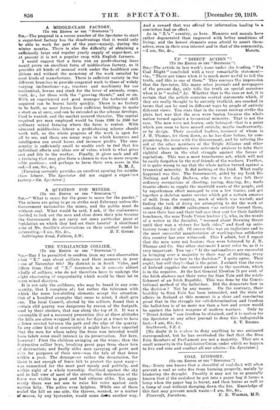A MIDDLE-CLASS FACTORY.
[To THE EDITOR OF THE " SPECTATOR."'
Sue—The proposal in a recent number of the Spectator to start a sugar-beet factory has the disadvantage that it would only be able to work for part of the year—namely, during the winter months. There is also the difficulty of obtaining a sufficiently large and regular yearly supply of sugar-beet, as at present it is not a popular crop with English farmers.
I would suggest that a farm run on profit-sharing lines would prove an excellent form of middle-class factory, as it provides all kinds of manual work under the healthiest con- ditions and without the monotony of the work entailed by most kinds of manufacture. There is sufficient variety in the different branches to provide congenial work to those of widely varying inclinations—e.g., tractors and machinery for tae mechanical, horses and stock for the lover of animals, crops, fruit, &c., for those with the "growing thumb," and so on. With an experienced and good manager the technical skill required can be learnt fairly quickly. There is no factory to be built, as most farms have sufficient buildings to make a start on at once, and can be extended as the scheme develops. rood is wanted, and the market assured therefor. The capital required per man employed would be from £300 to £500 for ordinary mixed farming where the farm is rented. With educated middle-class labour a profit-sharing scheme should work well, as the whole progress of the work is open for• all to see, and there are many ways in which keenness and intelligence can avoid losses and increase profits. The com- munity is sufficiently small to enable each to feel that Isis individual efforts and ideas are of value, which is what gives zest and life to the worker. Finally, it gives each and all a training that may give them a chance to rise to more respon- sible position:, and perhaps to farm their own acres in the end.—I am, Sir, &c., B. M. J. [Farming certainly provides an excellent opening for middle- class labour. The Spectator did not suggest a sugar-'set factory.—ED. Spectator.]






































 Previous page
Previous page